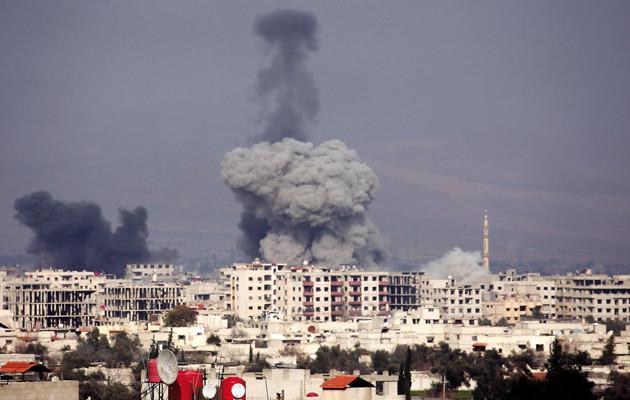
Residents of Syria’s Eastern Ghouta district said they were waiting their “turn to die” on Feb. 21, amid one of the most intense bombardments of the war by pro-government forces on the besieged, rebel-held enclave near Damascus.
At least 10 people died in one village and more than 200 were injured early on Feb. 21.
At least 296 people have been killed in the district in the last three days, the British-based Syrian Observatory for Human Rights war monitor said.
Another 13 bodies, including five children, were recovered from the rubble of houses destroyed on Feb. 20 in the villages of Arbin and Saqba, the Observatory reported.
The Eastern Ghouta, a densely populated agricultural district on the Damascus outskirts, is the last major area near the capital still under rebel control. Home to 400,000 people, it has been besieged by government forces for years.
A massive escalation in bombardment, including rocket fire, shelling, air strikes and helicopter-dropped barrel bombs since Feb. 18 has become one of the deadliest of the Syrian civil war, now entering its eighth year.
Reuters photographs taken in eastern Ghouta on Feb. 21 showed men searching through the rubble of smashed buildings, carrying blood-smeared people to hospital and cowering in debris-strewn streets.
The United Nations has denounced the bombardment, which has struck hospitals and other civilian infrastructure, saying such attacks could be war crimes.
The pace of the strikes appeared to slacken overnight, but its intensity resumed later on Feb. 21, the Observatory said. Pro-government forces fired hundreds of rockets and dropped barrel bombs from helicopters on the district’s towns and villages.
“We are waiting our turn to die. This is the only thing I can say,” said Bilal Abu Salah, 22, whose wife is five months pregnant with their first child in the biggest eastern Ghouta town Douma.
They fear the terror of the bombardment will bring her into labor early, he said.
“Nearly all people living here live in shelters now. There are five or six families in one home. There is no food, no markets,” he said.
The Union of Medical Care and Relief Organizations, a group of foreign agencies that fund hospitals in opposition-held parts of Syria, said eight medical facilities in eastern Ghouta had been attacked on Feb. 20.
The Syrian government and its ally Russia, which has backed Assad with air power since 2015, say they do not target civilians. They also deny using the inaccurate explosive barrel bombs dropped from helicopters whose use has been condemned by the United Nations.
A commander in the coalition fighting on behalf of Assad’s government told Reuters overnight the bombing aims to prevent the rebels from targeting the eastern neighborhoods of Damascus with mortars. It may be followed by a ground campaign.
“The offensive has not started yet. This is preliminary bombing,” the commander said.
Rebels have also been firing mortars on the districts of Damascus near eastern Ghouta, wounding two people on Feb. 21, state media reported. Rebel mortars killed at least six people on Feb. 20.
“Today, residential areas, Damascus hotels, as well as Russia’s Centre for Syrian Reconciliation, received massive bombardment by illegal armed groups from eastern Ghouta,” Russia’s Defense Ministry said late on Feb. 20.
Eastern Ghouta is one of a group of “de-escalation zones” under a diplomatic ceasefire initiative agreed by Assad’s allies Russia and Iran with Turkey which cooperates with the Free Syrian Army (FSA) on the ground.
Conditions in Eastern Ghouta, besieged since 2013, had increasingly alarmed aid agencies even before the latest assault, as shortages of food, medicine and other basic necessities caused suffering and illness.